Tax Planning for Self-Employed Independent Consultants
VerifiedAdded on 2023/06/10
|10
|2897
|330
AI Summary
This article provides tax planning recommendations for self-employed independent consultants. It covers topics such as car leasing, investment portfolio, home purchase, and common tax deductions. The article suggests that Jason should lease a car, utilize his RRSP and TFSA accounts, and claim deductions for home office expenses, automobile expenses, entertainment and meal expenses, and income splitting.
Contribute Materials
Your contribution can guide someone’s learning journey. Share your
documents today.

Tax Planning
Jason Smith
Jason Smith
Secure Best Marks with AI Grader
Need help grading? Try our AI Grader for instant feedback on your assignments.
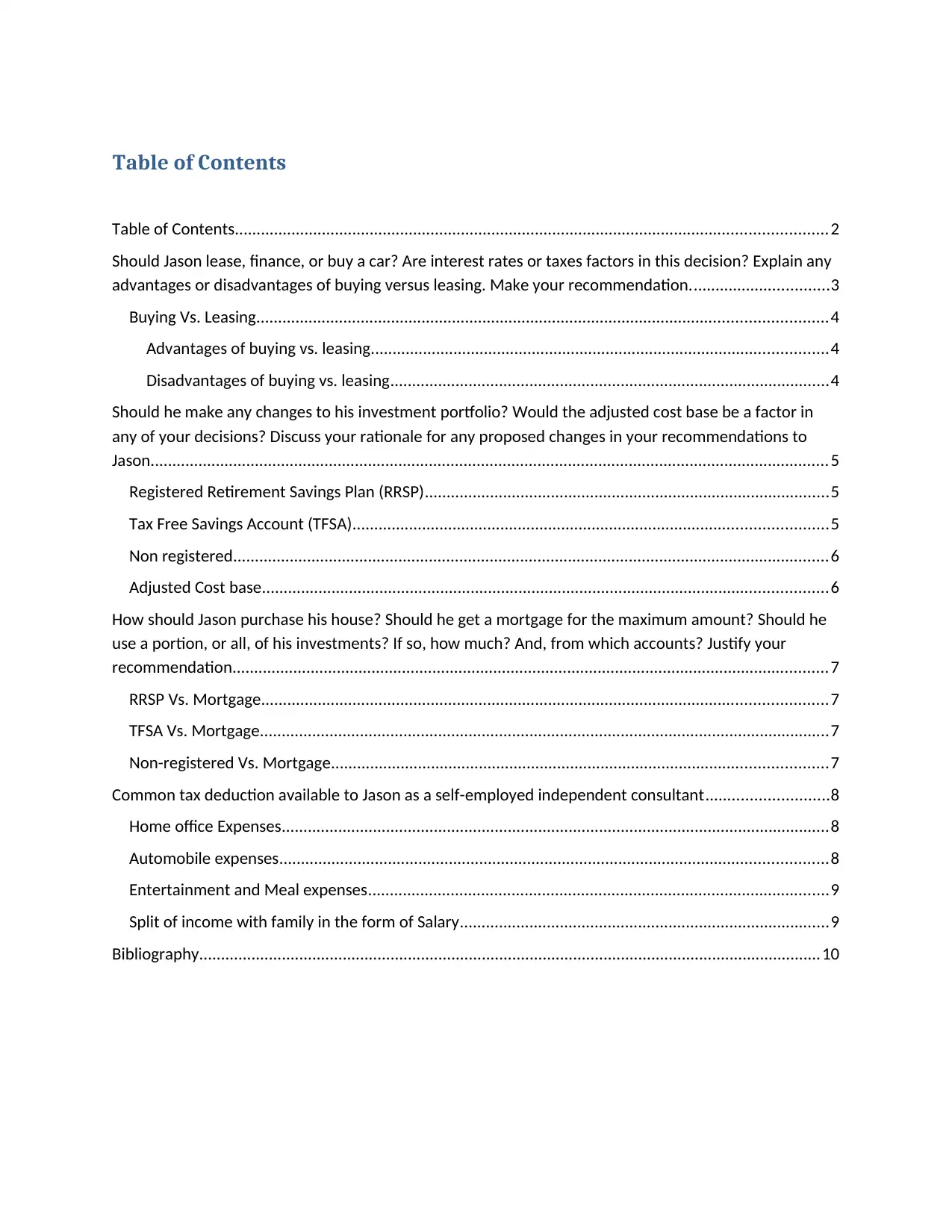
Table of Contents
Table of Contents........................................................................................................................................2
Should Jason lease, finance, or buy a car? Are interest rates or taxes factors in this decision? Explain any
advantages or disadvantages of buying versus leasing. Make your recommendation................................3
Buying Vs. Leasing...................................................................................................................................4
Advantages of buying vs. leasing.........................................................................................................4
Disadvantages of buying vs. leasing.....................................................................................................4
Should he make any changes to his investment portfolio? Would the adjusted cost base be a factor in
any of your decisions? Discuss your rationale for any proposed changes in your recommendations to
Jason............................................................................................................................................................5
Registered Retirement Savings Plan (RRSP).............................................................................................5
Tax Free Savings Account (TFSA).............................................................................................................5
Non registered.........................................................................................................................................6
Adjusted Cost base..................................................................................................................................6
How should Jason purchase his house? Should he get a mortgage for the maximum amount? Should he
use a portion, or all, of his investments? If so, how much? And, from which accounts? Justify your
recommendation.........................................................................................................................................7
RRSP Vs. Mortgage..................................................................................................................................7
TFSA Vs. Mortgage...................................................................................................................................7
Non-registered Vs. Mortgage..................................................................................................................7
Common tax deduction available to Jason as a self-employed independent consultant............................8
Home office Expenses..............................................................................................................................8
Automobile expenses..............................................................................................................................8
Entertainment and Meal expenses..........................................................................................................9
Split of income with family in the form of Salary.....................................................................................9
Bibliography...............................................................................................................................................10
Table of Contents........................................................................................................................................2
Should Jason lease, finance, or buy a car? Are interest rates or taxes factors in this decision? Explain any
advantages or disadvantages of buying versus leasing. Make your recommendation................................3
Buying Vs. Leasing...................................................................................................................................4
Advantages of buying vs. leasing.........................................................................................................4
Disadvantages of buying vs. leasing.....................................................................................................4
Should he make any changes to his investment portfolio? Would the adjusted cost base be a factor in
any of your decisions? Discuss your rationale for any proposed changes in your recommendations to
Jason............................................................................................................................................................5
Registered Retirement Savings Plan (RRSP).............................................................................................5
Tax Free Savings Account (TFSA).............................................................................................................5
Non registered.........................................................................................................................................6
Adjusted Cost base..................................................................................................................................6
How should Jason purchase his house? Should he get a mortgage for the maximum amount? Should he
use a portion, or all, of his investments? If so, how much? And, from which accounts? Justify your
recommendation.........................................................................................................................................7
RRSP Vs. Mortgage..................................................................................................................................7
TFSA Vs. Mortgage...................................................................................................................................7
Non-registered Vs. Mortgage..................................................................................................................7
Common tax deduction available to Jason as a self-employed independent consultant............................8
Home office Expenses..............................................................................................................................8
Automobile expenses..............................................................................................................................8
Entertainment and Meal expenses..........................................................................................................9
Split of income with family in the form of Salary.....................................................................................9
Bibliography...............................................................................................................................................10
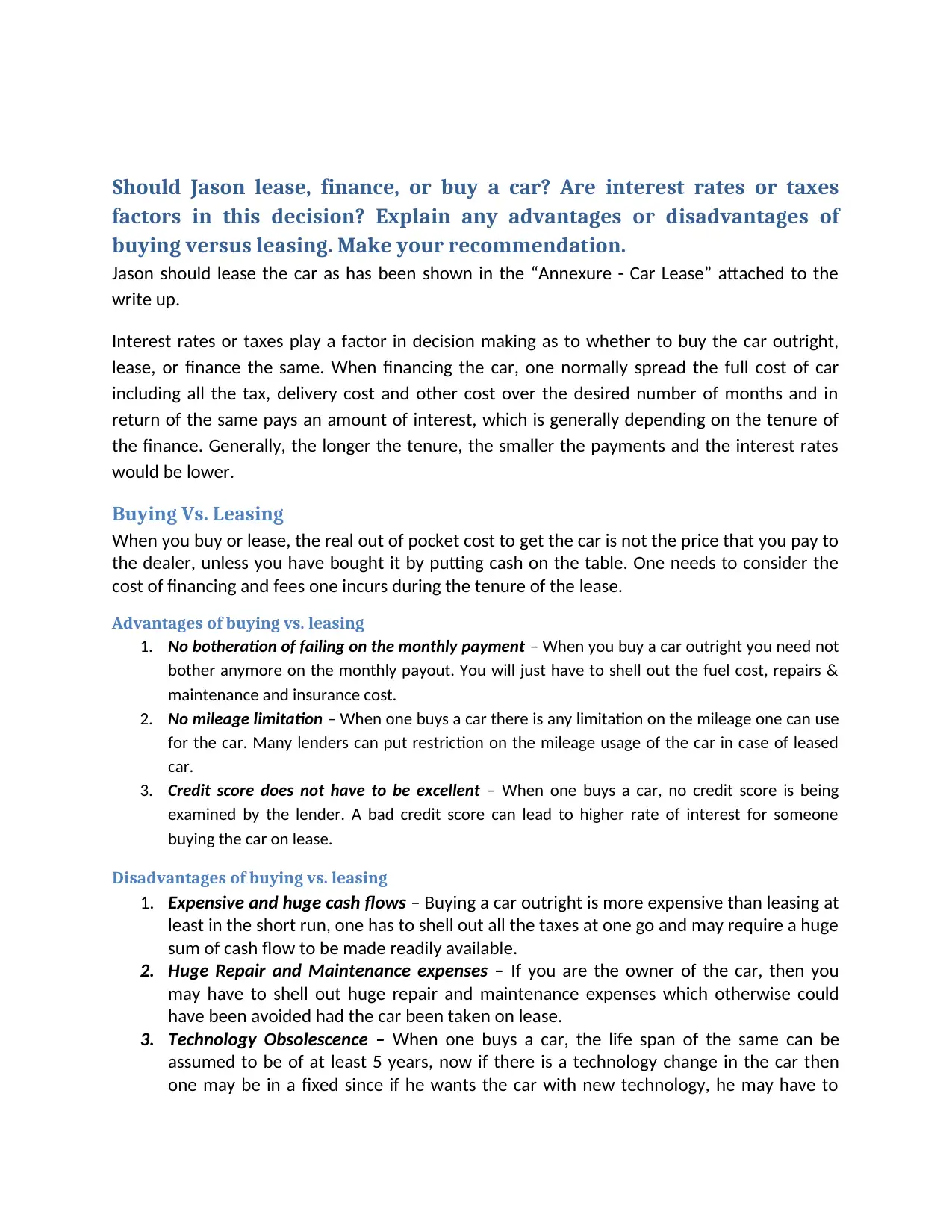
Should Jason lease, finance, or buy a car? Are interest rates or taxes
factors in this decision? Explain any advantages or disadvantages of
buying versus leasing. Make your recommendation.
Jason should lease the car as has been shown in the “Annexure - Car Lease” attached to the
write up.
Interest rates or taxes play a factor in decision making as to whether to buy the car outright,
lease, or finance the same. When financing the car, one normally spread the full cost of car
including all the tax, delivery cost and other cost over the desired number of months and in
return of the same pays an amount of interest, which is generally depending on the tenure of
the finance. Generally, the longer the tenure, the smaller the payments and the interest rates
would be lower.
Buying Vs. Leasing
When you buy or lease, the real out of pocket cost to get the car is not the price that you pay to
the dealer, unless you have bought it by putting cash on the table. One needs to consider the
cost of financing and fees one incurs during the tenure of the lease.
Advantages of buying vs. leasing
1. No botheration of failing on the monthly payment – When you buy a car outright you need not
bother anymore on the monthly payout. You will just have to shell out the fuel cost, repairs &
maintenance and insurance cost.
2. No mileage limitation – When one buys a car there is any limitation on the mileage one can use
for the car. Many lenders can put restriction on the mileage usage of the car in case of leased
car.
3. Credit score does not have to be excellent – When one buys a car, no credit score is being
examined by the lender. A bad credit score can lead to higher rate of interest for someone
buying the car on lease.
Disadvantages of buying vs. leasing
1. Expensive and huge cash flows – Buying a car outright is more expensive than leasing at
least in the short run, one has to shell out all the taxes at one go and may require a huge
sum of cash flow to be made readily available.
2. Huge Repair and Maintenance expenses – If you are the owner of the car, then you
may have to shell out huge repair and maintenance expenses which otherwise could
have been avoided had the car been taken on lease.
3. Technology Obsolescence – When one buys a car, the life span of the same can be
assumed to be of at least 5 years, now if there is a technology change in the car then
one may be in a fixed since if he wants the car with new technology, he may have to
factors in this decision? Explain any advantages or disadvantages of
buying versus leasing. Make your recommendation.
Jason should lease the car as has been shown in the “Annexure - Car Lease” attached to the
write up.
Interest rates or taxes play a factor in decision making as to whether to buy the car outright,
lease, or finance the same. When financing the car, one normally spread the full cost of car
including all the tax, delivery cost and other cost over the desired number of months and in
return of the same pays an amount of interest, which is generally depending on the tenure of
the finance. Generally, the longer the tenure, the smaller the payments and the interest rates
would be lower.
Buying Vs. Leasing
When you buy or lease, the real out of pocket cost to get the car is not the price that you pay to
the dealer, unless you have bought it by putting cash on the table. One needs to consider the
cost of financing and fees one incurs during the tenure of the lease.
Advantages of buying vs. leasing
1. No botheration of failing on the monthly payment – When you buy a car outright you need not
bother anymore on the monthly payout. You will just have to shell out the fuel cost, repairs &
maintenance and insurance cost.
2. No mileage limitation – When one buys a car there is any limitation on the mileage one can use
for the car. Many lenders can put restriction on the mileage usage of the car in case of leased
car.
3. Credit score does not have to be excellent – When one buys a car, no credit score is being
examined by the lender. A bad credit score can lead to higher rate of interest for someone
buying the car on lease.
Disadvantages of buying vs. leasing
1. Expensive and huge cash flows – Buying a car outright is more expensive than leasing at
least in the short run, one has to shell out all the taxes at one go and may require a huge
sum of cash flow to be made readily available.
2. Huge Repair and Maintenance expenses – If you are the owner of the car, then you
may have to shell out huge repair and maintenance expenses which otherwise could
have been avoided had the car been taken on lease.
3. Technology Obsolescence – When one buys a car, the life span of the same can be
assumed to be of at least 5 years, now if there is a technology change in the car then
one may be in a fixed since if he wants the car with new technology, he may have to

shell out additional money for the same, in case of leasing it becomes easier to switch
cars.
cars.
Secure Best Marks with AI Grader
Need help grading? Try our AI Grader for instant feedback on your assignments.
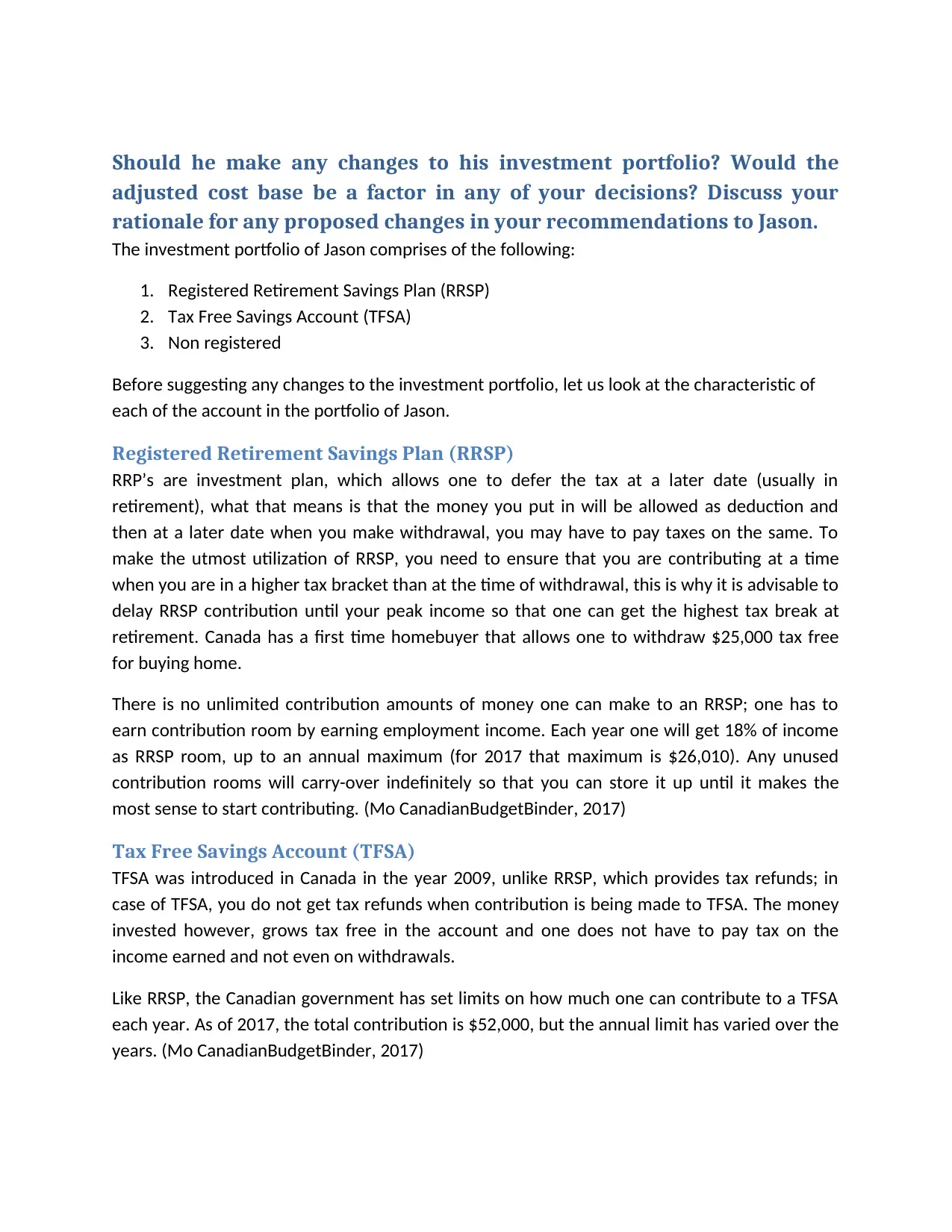
Should he make any changes to his investment portfolio? Would the
adjusted cost base be a factor in any of your decisions? Discuss your
rationale for any proposed changes in your recommendations to Jason.
The investment portfolio of Jason comprises of the following:
1. Registered Retirement Savings Plan (RRSP)
2. Tax Free Savings Account (TFSA)
3. Non registered
Before suggesting any changes to the investment portfolio, let us look at the characteristic of
each of the account in the portfolio of Jason.
Registered Retirement Savings Plan (RRSP)
RRP’s are investment plan, which allows one to defer the tax at a later date (usually in
retirement), what that means is that the money you put in will be allowed as deduction and
then at a later date when you make withdrawal, you may have to pay taxes on the same. To
make the utmost utilization of RRSP, you need to ensure that you are contributing at a time
when you are in a higher tax bracket than at the time of withdrawal, this is why it is advisable to
delay RRSP contribution until your peak income so that one can get the highest tax break at
retirement. Canada has a first time homebuyer that allows one to withdraw $25,000 tax free
for buying home.
There is no unlimited contribution amounts of money one can make to an RRSP; one has to
earn contribution room by earning employment income. Each year one will get 18% of income
as RRSP room, up to an annual maximum (for 2017 that maximum is $26,010). Any unused
contribution rooms will carry-over indefinitely so that you can store it up until it makes the
most sense to start contributing. (Mo CanadianBudgetBinder, 2017)
Tax Free Savings Account (TFSA)
TFSA was introduced in Canada in the year 2009, unlike RRSP, which provides tax refunds; in
case of TFSA, you do not get tax refunds when contribution is being made to TFSA. The money
invested however, grows tax free in the account and one does not have to pay tax on the
income earned and not even on withdrawals.
Like RRSP, the Canadian government has set limits on how much one can contribute to a TFSA
each year. As of 2017, the total contribution is $52,000, but the annual limit has varied over the
years. (Mo CanadianBudgetBinder, 2017)
adjusted cost base be a factor in any of your decisions? Discuss your
rationale for any proposed changes in your recommendations to Jason.
The investment portfolio of Jason comprises of the following:
1. Registered Retirement Savings Plan (RRSP)
2. Tax Free Savings Account (TFSA)
3. Non registered
Before suggesting any changes to the investment portfolio, let us look at the characteristic of
each of the account in the portfolio of Jason.
Registered Retirement Savings Plan (RRSP)
RRP’s are investment plan, which allows one to defer the tax at a later date (usually in
retirement), what that means is that the money you put in will be allowed as deduction and
then at a later date when you make withdrawal, you may have to pay taxes on the same. To
make the utmost utilization of RRSP, you need to ensure that you are contributing at a time
when you are in a higher tax bracket than at the time of withdrawal, this is why it is advisable to
delay RRSP contribution until your peak income so that one can get the highest tax break at
retirement. Canada has a first time homebuyer that allows one to withdraw $25,000 tax free
for buying home.
There is no unlimited contribution amounts of money one can make to an RRSP; one has to
earn contribution room by earning employment income. Each year one will get 18% of income
as RRSP room, up to an annual maximum (for 2017 that maximum is $26,010). Any unused
contribution rooms will carry-over indefinitely so that you can store it up until it makes the
most sense to start contributing. (Mo CanadianBudgetBinder, 2017)
Tax Free Savings Account (TFSA)
TFSA was introduced in Canada in the year 2009, unlike RRSP, which provides tax refunds; in
case of TFSA, you do not get tax refunds when contribution is being made to TFSA. The money
invested however, grows tax free in the account and one does not have to pay tax on the
income earned and not even on withdrawals.
Like RRSP, the Canadian government has set limits on how much one can contribute to a TFSA
each year. As of 2017, the total contribution is $52,000, but the annual limit has varied over the
years. (Mo CanadianBudgetBinder, 2017)
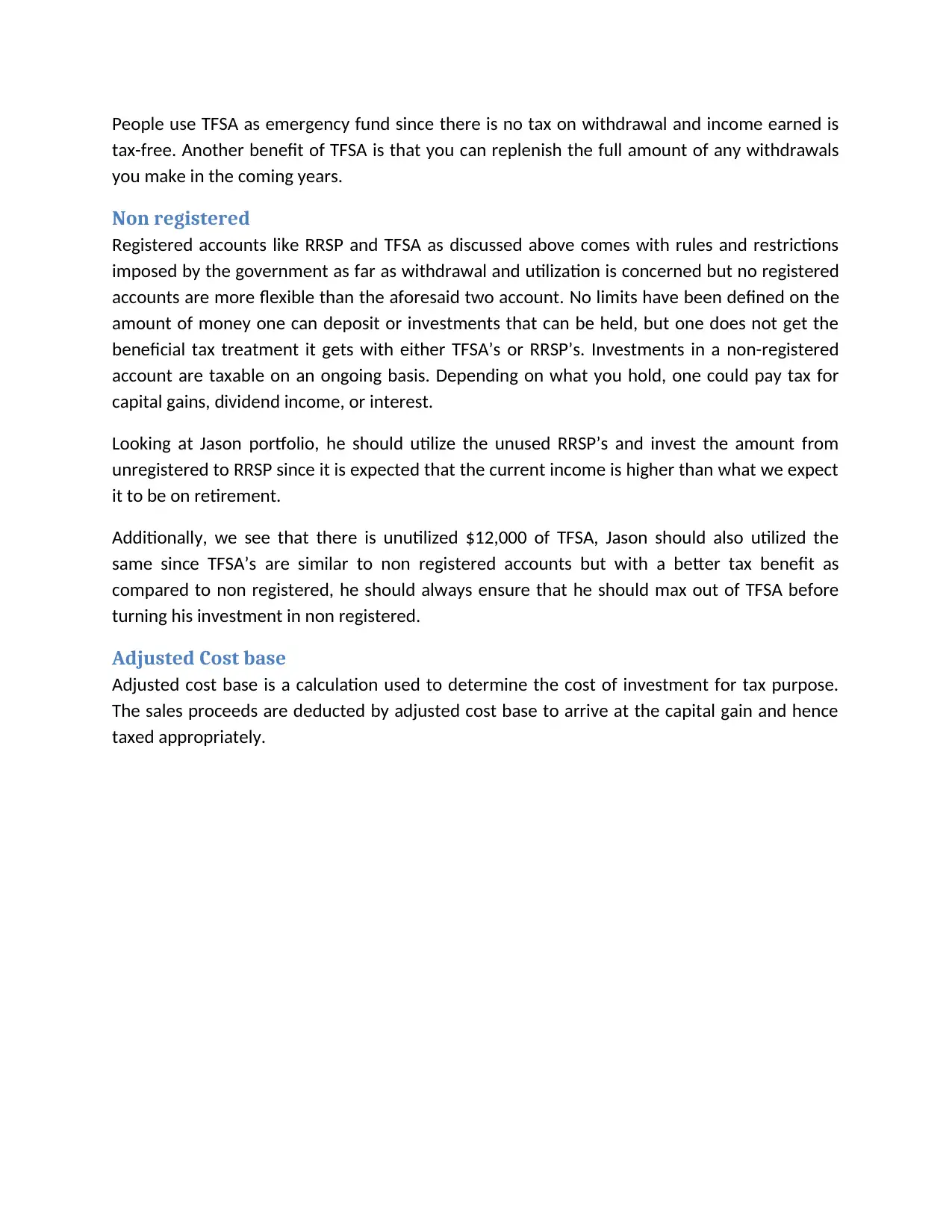
People use TFSA as emergency fund since there is no tax on withdrawal and income earned is
tax-free. Another benefit of TFSA is that you can replenish the full amount of any withdrawals
you make in the coming years.
Non registered
Registered accounts like RRSP and TFSA as discussed above comes with rules and restrictions
imposed by the government as far as withdrawal and utilization is concerned but no registered
accounts are more flexible than the aforesaid two account. No limits have been defined on the
amount of money one can deposit or investments that can be held, but one does not get the
beneficial tax treatment it gets with either TFSA’s or RRSP’s. Investments in a non-registered
account are taxable on an ongoing basis. Depending on what you hold, one could pay tax for
capital gains, dividend income, or interest.
Looking at Jason portfolio, he should utilize the unused RRSP’s and invest the amount from
unregistered to RRSP since it is expected that the current income is higher than what we expect
it to be on retirement.
Additionally, we see that there is unutilized $12,000 of TFSA, Jason should also utilized the
same since TFSA’s are similar to non registered accounts but with a better tax benefit as
compared to non registered, he should always ensure that he should max out of TFSA before
turning his investment in non registered.
Adjusted Cost base
Adjusted cost base is a calculation used to determine the cost of investment for tax purpose.
The sales proceeds are deducted by adjusted cost base to arrive at the capital gain and hence
taxed appropriately.
tax-free. Another benefit of TFSA is that you can replenish the full amount of any withdrawals
you make in the coming years.
Non registered
Registered accounts like RRSP and TFSA as discussed above comes with rules and restrictions
imposed by the government as far as withdrawal and utilization is concerned but no registered
accounts are more flexible than the aforesaid two account. No limits have been defined on the
amount of money one can deposit or investments that can be held, but one does not get the
beneficial tax treatment it gets with either TFSA’s or RRSP’s. Investments in a non-registered
account are taxable on an ongoing basis. Depending on what you hold, one could pay tax for
capital gains, dividend income, or interest.
Looking at Jason portfolio, he should utilize the unused RRSP’s and invest the amount from
unregistered to RRSP since it is expected that the current income is higher than what we expect
it to be on retirement.
Additionally, we see that there is unutilized $12,000 of TFSA, Jason should also utilized the
same since TFSA’s are similar to non registered accounts but with a better tax benefit as
compared to non registered, he should always ensure that he should max out of TFSA before
turning his investment in non registered.
Adjusted Cost base
Adjusted cost base is a calculation used to determine the cost of investment for tax purpose.
The sales proceeds are deducted by adjusted cost base to arrive at the capital gain and hence
taxed appropriately.
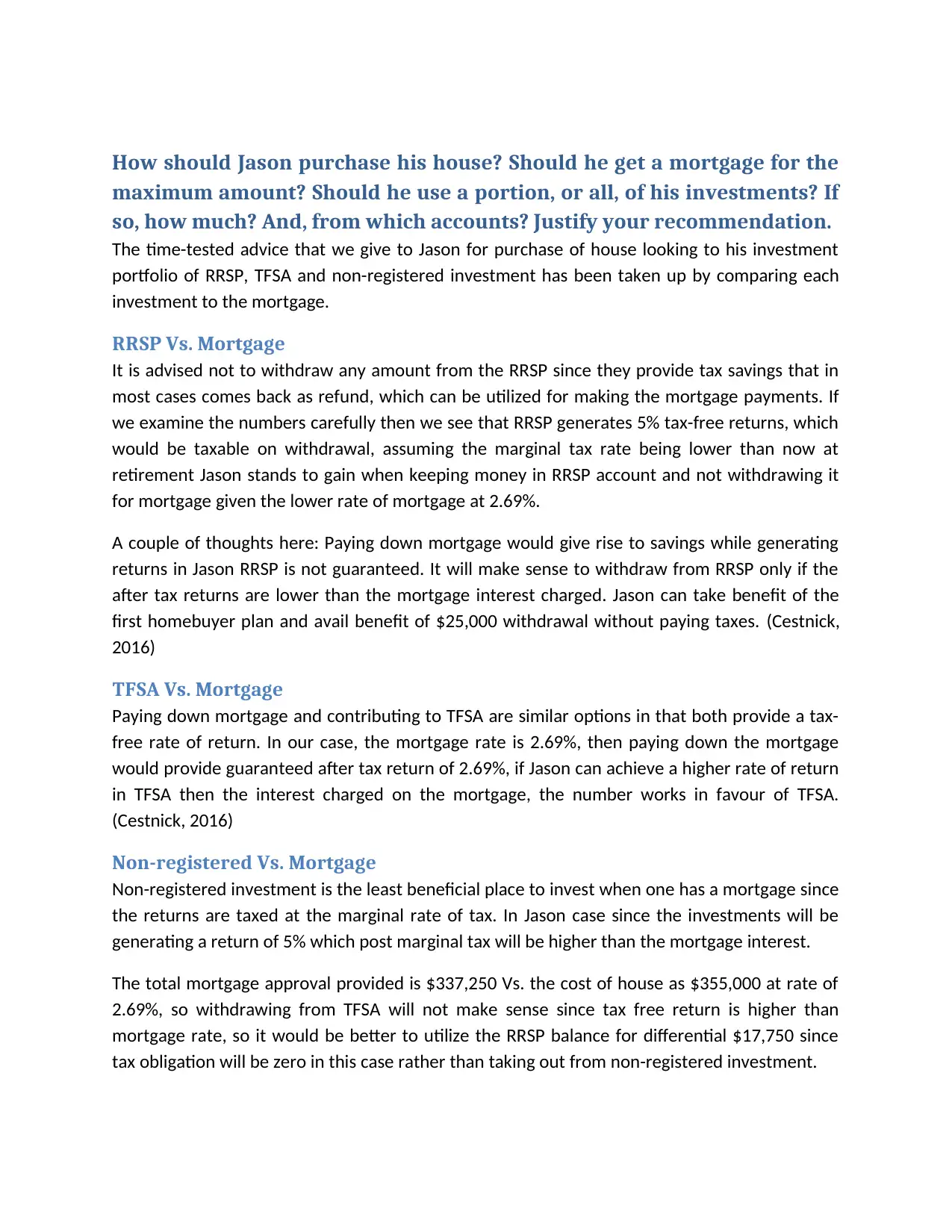
How should Jason purchase his house? Should he get a mortgage for the
maximum amount? Should he use a portion, or all, of his investments? If
so, how much? And, from which accounts? Justify your recommendation.
The time-tested advice that we give to Jason for purchase of house looking to his investment
portfolio of RRSP, TFSA and non-registered investment has been taken up by comparing each
investment to the mortgage.
RRSP Vs. Mortgage
It is advised not to withdraw any amount from the RRSP since they provide tax savings that in
most cases comes back as refund, which can be utilized for making the mortgage payments. If
we examine the numbers carefully then we see that RRSP generates 5% tax-free returns, which
would be taxable on withdrawal, assuming the marginal tax rate being lower than now at
retirement Jason stands to gain when keeping money in RRSP account and not withdrawing it
for mortgage given the lower rate of mortgage at 2.69%.
A couple of thoughts here: Paying down mortgage would give rise to savings while generating
returns in Jason RRSP is not guaranteed. It will make sense to withdraw from RRSP only if the
after tax returns are lower than the mortgage interest charged. Jason can take benefit of the
first homebuyer plan and avail benefit of $25,000 withdrawal without paying taxes. (Cestnick,
2016)
TFSA Vs. Mortgage
Paying down mortgage and contributing to TFSA are similar options in that both provide a tax-
free rate of return. In our case, the mortgage rate is 2.69%, then paying down the mortgage
would provide guaranteed after tax return of 2.69%, if Jason can achieve a higher rate of return
in TFSA then the interest charged on the mortgage, the number works in favour of TFSA.
(Cestnick, 2016)
Non-registered Vs. Mortgage
Non-registered investment is the least beneficial place to invest when one has a mortgage since
the returns are taxed at the marginal rate of tax. In Jason case since the investments will be
generating a return of 5% which post marginal tax will be higher than the mortgage interest.
The total mortgage approval provided is $337,250 Vs. the cost of house as $355,000 at rate of
2.69%, so withdrawing from TFSA will not make sense since tax free return is higher than
mortgage rate, so it would be better to utilize the RRSP balance for differential $17,750 since
tax obligation will be zero in this case rather than taking out from non-registered investment.
maximum amount? Should he use a portion, or all, of his investments? If
so, how much? And, from which accounts? Justify your recommendation.
The time-tested advice that we give to Jason for purchase of house looking to his investment
portfolio of RRSP, TFSA and non-registered investment has been taken up by comparing each
investment to the mortgage.
RRSP Vs. Mortgage
It is advised not to withdraw any amount from the RRSP since they provide tax savings that in
most cases comes back as refund, which can be utilized for making the mortgage payments. If
we examine the numbers carefully then we see that RRSP generates 5% tax-free returns, which
would be taxable on withdrawal, assuming the marginal tax rate being lower than now at
retirement Jason stands to gain when keeping money in RRSP account and not withdrawing it
for mortgage given the lower rate of mortgage at 2.69%.
A couple of thoughts here: Paying down mortgage would give rise to savings while generating
returns in Jason RRSP is not guaranteed. It will make sense to withdraw from RRSP only if the
after tax returns are lower than the mortgage interest charged. Jason can take benefit of the
first homebuyer plan and avail benefit of $25,000 withdrawal without paying taxes. (Cestnick,
2016)
TFSA Vs. Mortgage
Paying down mortgage and contributing to TFSA are similar options in that both provide a tax-
free rate of return. In our case, the mortgage rate is 2.69%, then paying down the mortgage
would provide guaranteed after tax return of 2.69%, if Jason can achieve a higher rate of return
in TFSA then the interest charged on the mortgage, the number works in favour of TFSA.
(Cestnick, 2016)
Non-registered Vs. Mortgage
Non-registered investment is the least beneficial place to invest when one has a mortgage since
the returns are taxed at the marginal rate of tax. In Jason case since the investments will be
generating a return of 5% which post marginal tax will be higher than the mortgage interest.
The total mortgage approval provided is $337,250 Vs. the cost of house as $355,000 at rate of
2.69%, so withdrawing from TFSA will not make sense since tax free return is higher than
mortgage rate, so it would be better to utilize the RRSP balance for differential $17,750 since
tax obligation will be zero in this case rather than taking out from non-registered investment.
Paraphrase This Document
Need a fresh take? Get an instant paraphrase of this document with our AI Paraphraser
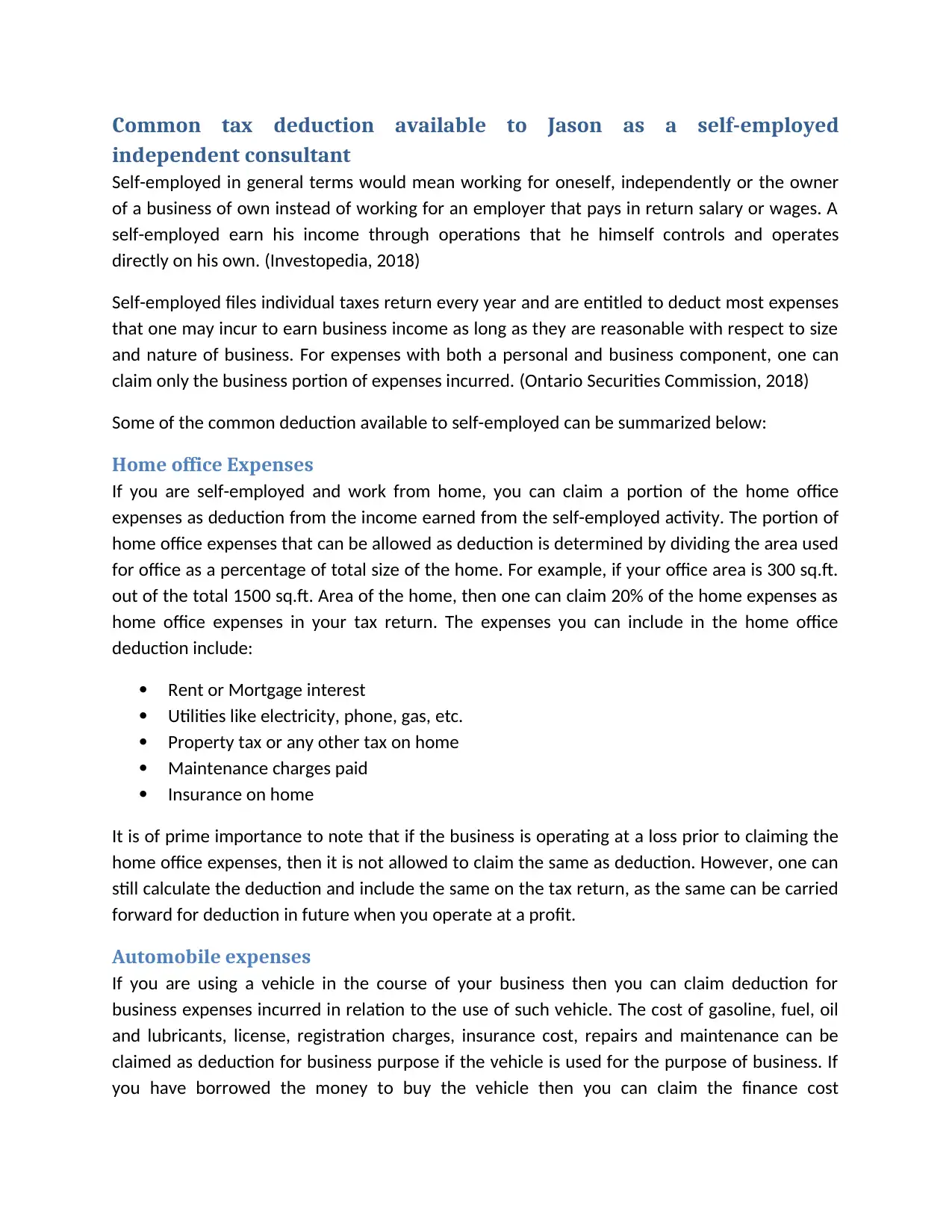
Common tax deduction available to Jason as a self-employed
independent consultant
Self-employed in general terms would mean working for oneself, independently or the owner
of a business of own instead of working for an employer that pays in return salary or wages. A
self-employed earn his income through operations that he himself controls and operates
directly on his own. (Investopedia, 2018)
Self-employed files individual taxes return every year and are entitled to deduct most expenses
that one may incur to earn business income as long as they are reasonable with respect to size
and nature of business. For expenses with both a personal and business component, one can
claim only the business portion of expenses incurred. (Ontario Securities Commission, 2018)
Some of the common deduction available to self-employed can be summarized below:
Home office Expenses
If you are self-employed and work from home, you can claim a portion of the home office
expenses as deduction from the income earned from the self-employed activity. The portion of
home office expenses that can be allowed as deduction is determined by dividing the area used
for office as a percentage of total size of the home. For example, if your office area is 300 sq.ft.
out of the total 1500 sq.ft. Area of the home, then one can claim 20% of the home expenses as
home office expenses in your tax return. The expenses you can include in the home office
deduction include:
Rent or Mortgage interest
Utilities like electricity, phone, gas, etc.
Property tax or any other tax on home
Maintenance charges paid
Insurance on home
It is of prime importance to note that if the business is operating at a loss prior to claiming the
home office expenses, then it is not allowed to claim the same as deduction. However, one can
still calculate the deduction and include the same on the tax return, as the same can be carried
forward for deduction in future when you operate at a profit.
Automobile expenses
If you are using a vehicle in the course of your business then you can claim deduction for
business expenses incurred in relation to the use of such vehicle. The cost of gasoline, fuel, oil
and lubricants, license, registration charges, insurance cost, repairs and maintenance can be
claimed as deduction for business purpose if the vehicle is used for the purpose of business. If
you have borrowed the money to buy the vehicle then you can claim the finance cost
independent consultant
Self-employed in general terms would mean working for oneself, independently or the owner
of a business of own instead of working for an employer that pays in return salary or wages. A
self-employed earn his income through operations that he himself controls and operates
directly on his own. (Investopedia, 2018)
Self-employed files individual taxes return every year and are entitled to deduct most expenses
that one may incur to earn business income as long as they are reasonable with respect to size
and nature of business. For expenses with both a personal and business component, one can
claim only the business portion of expenses incurred. (Ontario Securities Commission, 2018)
Some of the common deduction available to self-employed can be summarized below:
Home office Expenses
If you are self-employed and work from home, you can claim a portion of the home office
expenses as deduction from the income earned from the self-employed activity. The portion of
home office expenses that can be allowed as deduction is determined by dividing the area used
for office as a percentage of total size of the home. For example, if your office area is 300 sq.ft.
out of the total 1500 sq.ft. Area of the home, then one can claim 20% of the home expenses as
home office expenses in your tax return. The expenses you can include in the home office
deduction include:
Rent or Mortgage interest
Utilities like electricity, phone, gas, etc.
Property tax or any other tax on home
Maintenance charges paid
Insurance on home
It is of prime importance to note that if the business is operating at a loss prior to claiming the
home office expenses, then it is not allowed to claim the same as deduction. However, one can
still calculate the deduction and include the same on the tax return, as the same can be carried
forward for deduction in future when you operate at a profit.
Automobile expenses
If you are using a vehicle in the course of your business then you can claim deduction for
business expenses incurred in relation to the use of such vehicle. The cost of gasoline, fuel, oil
and lubricants, license, registration charges, insurance cost, repairs and maintenance can be
claimed as deduction for business purpose if the vehicle is used for the purpose of business. If
you have borrowed the money to buy the vehicle then you can claim the finance cost
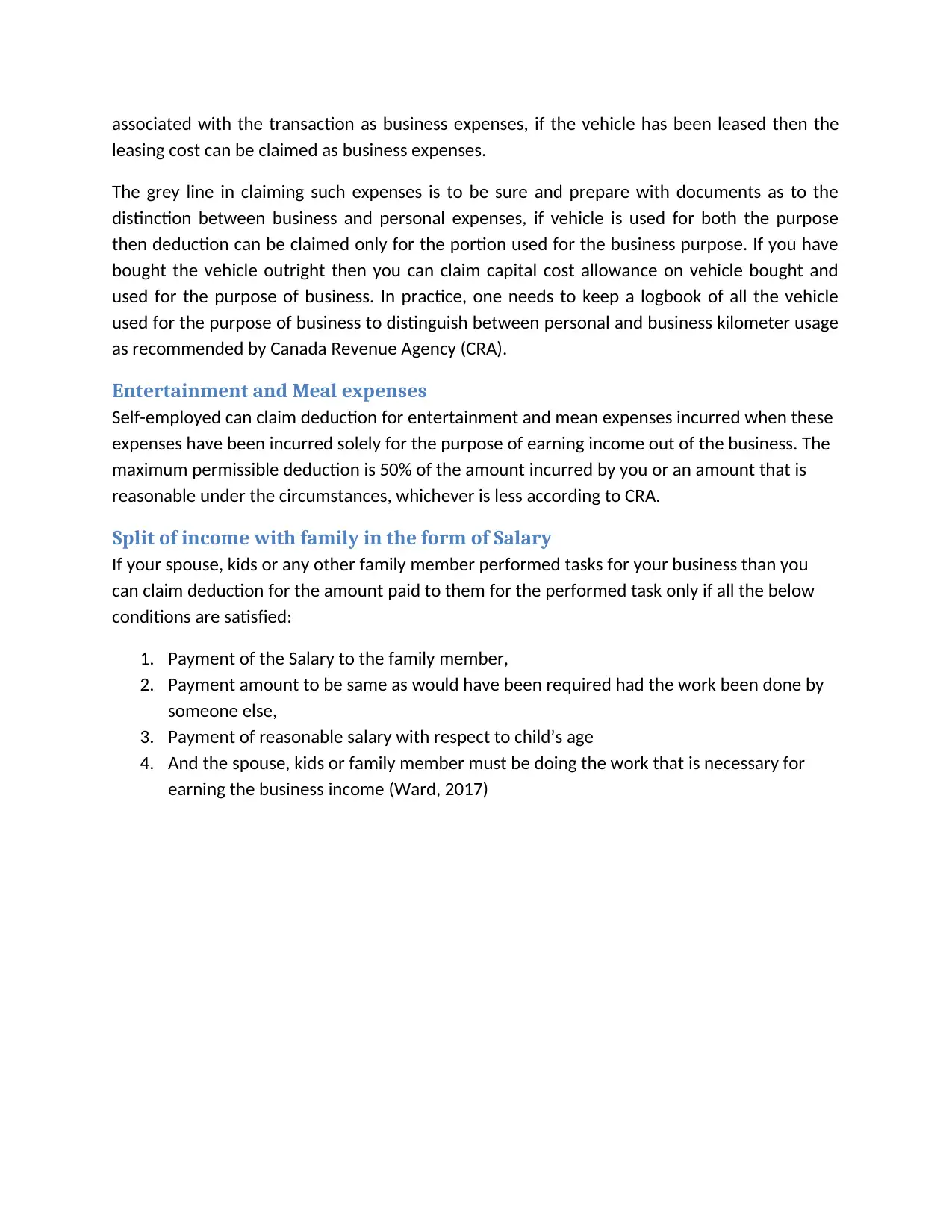
associated with the transaction as business expenses, if the vehicle has been leased then the
leasing cost can be claimed as business expenses.
The grey line in claiming such expenses is to be sure and prepare with documents as to the
distinction between business and personal expenses, if vehicle is used for both the purpose
then deduction can be claimed only for the portion used for the business purpose. If you have
bought the vehicle outright then you can claim capital cost allowance on vehicle bought and
used for the purpose of business. In practice, one needs to keep a logbook of all the vehicle
used for the purpose of business to distinguish between personal and business kilometer usage
as recommended by Canada Revenue Agency (CRA).
Entertainment and Meal expenses
Self-employed can claim deduction for entertainment and mean expenses incurred when these
expenses have been incurred solely for the purpose of earning income out of the business. The
maximum permissible deduction is 50% of the amount incurred by you or an amount that is
reasonable under the circumstances, whichever is less according to CRA.
Split of income with family in the form of Salary
If your spouse, kids or any other family member performed tasks for your business than you
can claim deduction for the amount paid to them for the performed task only if all the below
conditions are satisfied:
1. Payment of the Salary to the family member,
2. Payment amount to be same as would have been required had the work been done by
someone else,
3. Payment of reasonable salary with respect to child’s age
4. And the spouse, kids or family member must be doing the work that is necessary for
earning the business income (Ward, 2017)
leasing cost can be claimed as business expenses.
The grey line in claiming such expenses is to be sure and prepare with documents as to the
distinction between business and personal expenses, if vehicle is used for both the purpose
then deduction can be claimed only for the portion used for the business purpose. If you have
bought the vehicle outright then you can claim capital cost allowance on vehicle bought and
used for the purpose of business. In practice, one needs to keep a logbook of all the vehicle
used for the purpose of business to distinguish between personal and business kilometer usage
as recommended by Canada Revenue Agency (CRA).
Entertainment and Meal expenses
Self-employed can claim deduction for entertainment and mean expenses incurred when these
expenses have been incurred solely for the purpose of earning income out of the business. The
maximum permissible deduction is 50% of the amount incurred by you or an amount that is
reasonable under the circumstances, whichever is less according to CRA.
Split of income with family in the form of Salary
If your spouse, kids or any other family member performed tasks for your business than you
can claim deduction for the amount paid to them for the performed task only if all the below
conditions are satisfied:
1. Payment of the Salary to the family member,
2. Payment amount to be same as would have been required had the work been done by
someone else,
3. Payment of reasonable salary with respect to child’s age
4. And the spouse, kids or family member must be doing the work that is necessary for
earning the business income (Ward, 2017)
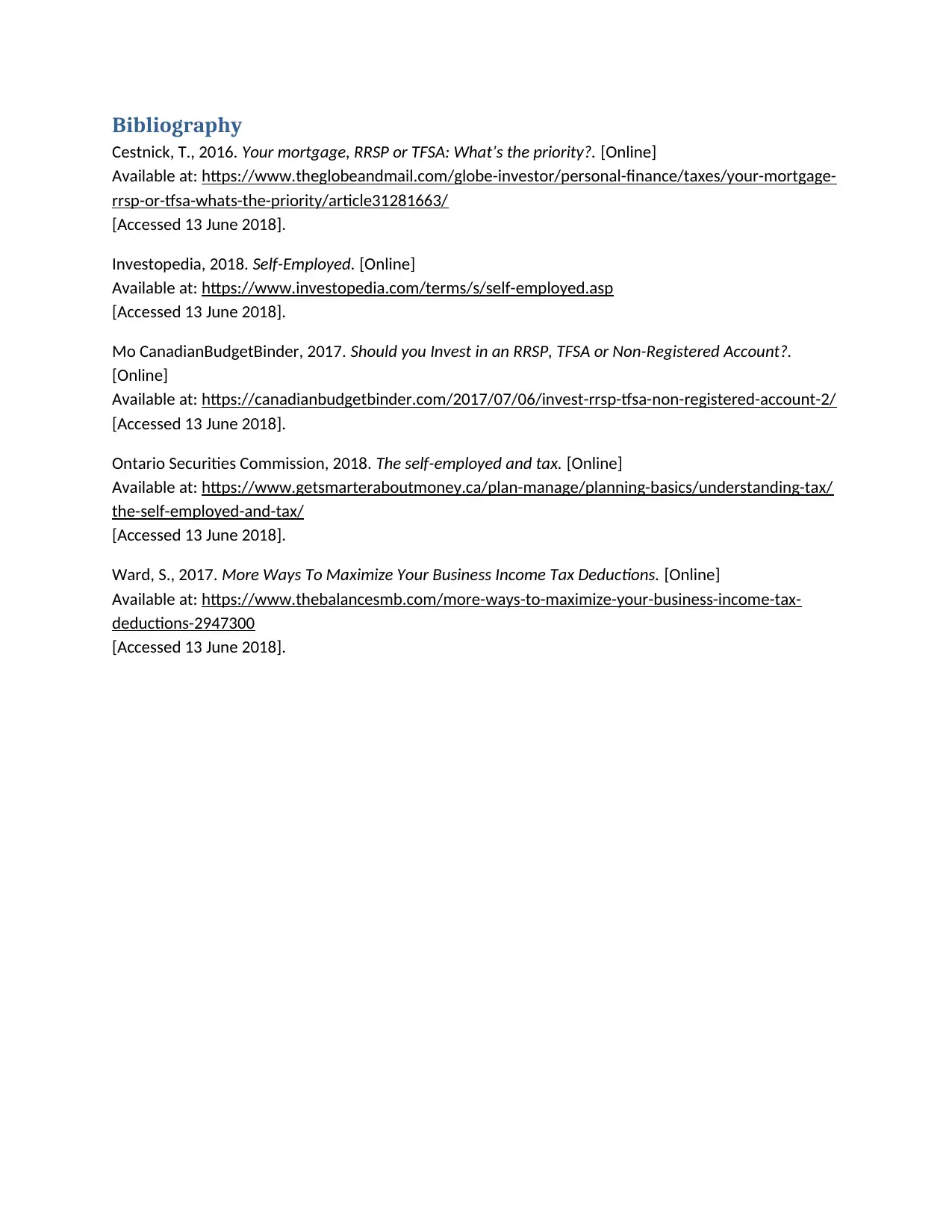
Bibliography
Cestnick, T., 2016. Your mortgage, RRSP or TFSA: What’s the priority?. [Online]
Available at: https://www.theglobeandmail.com/globe-investor/personal-finance/taxes/your-mortgage-
rrsp-or-tfsa-whats-the-priority/article31281663/
[Accessed 13 June 2018].
Investopedia, 2018. Self-Employed. [Online]
Available at: https://www.investopedia.com/terms/s/self-employed.asp
[Accessed 13 June 2018].
Mo CanadianBudgetBinder, 2017. Should you Invest in an RRSP, TFSA or Non-Registered Account?.
[Online]
Available at: https://canadianbudgetbinder.com/2017/07/06/invest-rrsp-tfsa-non-registered-account-2/
[Accessed 13 June 2018].
Ontario Securities Commission, 2018. The self-employed and tax. [Online]
Available at: https://www.getsmarteraboutmoney.ca/plan-manage/planning-basics/understanding-tax/
the-self-employed-and-tax/
[Accessed 13 June 2018].
Ward, S., 2017. More Ways To Maximize Your Business Income Tax Deductions. [Online]
Available at: https://www.thebalancesmb.com/more-ways-to-maximize-your-business-income-tax-
deductions-2947300
[Accessed 13 June 2018].
Cestnick, T., 2016. Your mortgage, RRSP or TFSA: What’s the priority?. [Online]
Available at: https://www.theglobeandmail.com/globe-investor/personal-finance/taxes/your-mortgage-
rrsp-or-tfsa-whats-the-priority/article31281663/
[Accessed 13 June 2018].
Investopedia, 2018. Self-Employed. [Online]
Available at: https://www.investopedia.com/terms/s/self-employed.asp
[Accessed 13 June 2018].
Mo CanadianBudgetBinder, 2017. Should you Invest in an RRSP, TFSA or Non-Registered Account?.
[Online]
Available at: https://canadianbudgetbinder.com/2017/07/06/invest-rrsp-tfsa-non-registered-account-2/
[Accessed 13 June 2018].
Ontario Securities Commission, 2018. The self-employed and tax. [Online]
Available at: https://www.getsmarteraboutmoney.ca/plan-manage/planning-basics/understanding-tax/
the-self-employed-and-tax/
[Accessed 13 June 2018].
Ward, S., 2017. More Ways To Maximize Your Business Income Tax Deductions. [Online]
Available at: https://www.thebalancesmb.com/more-ways-to-maximize-your-business-income-tax-
deductions-2947300
[Accessed 13 June 2018].
1 out of 10
Your All-in-One AI-Powered Toolkit for Academic Success.
+13062052269
info@desklib.com
Available 24*7 on WhatsApp / Email
![[object Object]](/_next/static/media/star-bottom.7253800d.svg)
Unlock your academic potential
© 2024 | Zucol Services PVT LTD | All rights reserved.
